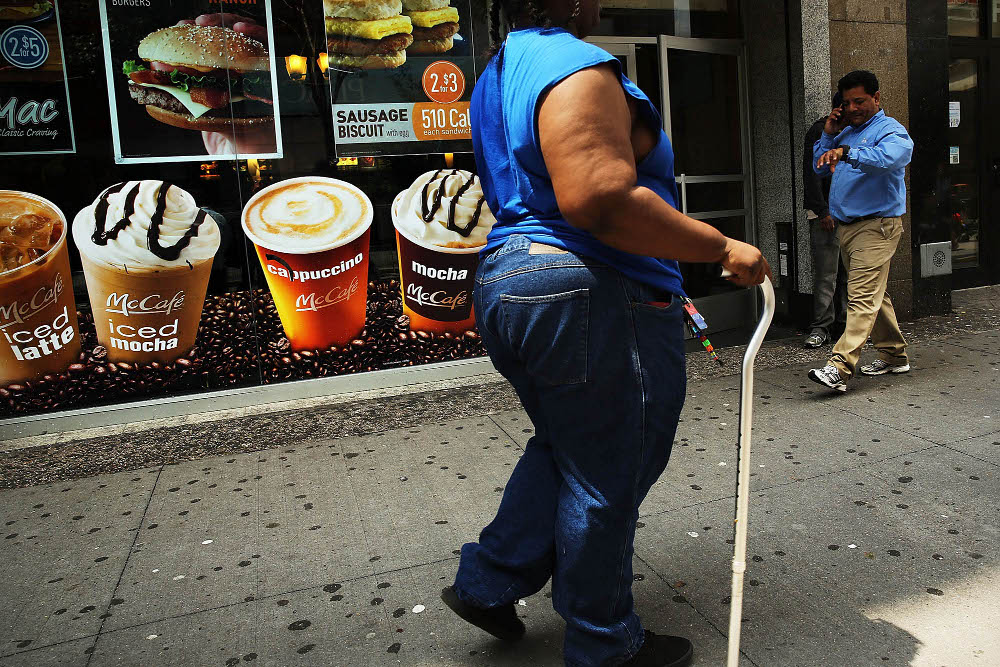South African running is itself a race to compete. (Nick Laham/Getty)
It’s that time of year again: the New Year fervour has begun to wane, the spirit of resolution is becoming diluted with the realities of daily life, and those running shoes are looking less attractive.
But a study published this week should give you an incentive to get your heart pumping: if you are inactive – whether you are fat or thin – a 20-minute walk a day could reduce your risk of an early death by between 16% to 30%.
The study, which included 334?161 European men and women over a period of more than 12 years, was published this week in the American Journal for Clinical Nutrition. It found that physical inactivity could have been responsible for twice as many deaths as obesity in some European countries in 2008.
Soren Brage, who was involved in the recent study and is the group leader of the physical activity epidemiology group at the University of Cambridge, said: “We found that inactivity was responsible for 7.35% of deaths [comparing their data with the European death statistics], whereas overall and abdominal obesity [determined by a person’s waist circumference] were responsible for only 3.66% and 6.53% of all deaths, respectively. This suggests, that, from a population perspective, inactivity is at least as important as obesity (twice compared to overall obesity).”
Although the data is representative for European populations, it can be extrapolated to South Africa, where people are getting fatter and are leading more sedentary lives, with desk jobs and little physical activity after work.
Fattest country
A study, published in the medical journal the Lancet last year found that seven out of 10 women and four out of 10 men in South Africa were overweight or obese, making the country the fattest in sub-Saharan Africa. This is almost double the global rate of nearly 30%, the Lancet study said.
Obesity has been linked to an increased risk of cardiovascular diseases, cancer and diabetes.
Dr Rebecca Meiring, a lecturer in the school of physiology at the University of Witwatersrand medical school, said more obese individuals were perceived as being unfit, and a great deal of research was being conducted into whether it is healthier to be overweight and fit, or lean and unfit.

Recent research has found that inactivity, whether you are overweight or not, reduces your chance of a long life. (Spencer Platt, Getty, AFP)
“In big cohort studies, there is emerging evidence that a lack of physical activity is an independent contributor to risk of diseases of lifestyle, such as cardiovascular disease and diabetes, regardless of BMI [body mass index, which is a ratio between a person’s height and their weight, which is used an indicator of obesity],” she said.
Brage said: “We should not ignore obesity as a public health problem [but] we may well solve some obesity issues if we managed to increase population levels of activity.”
Body mass index
Using height, weight and waist circumference, the study separated the participants into subgroups, depending on their BMI, and also their waist circumference, which is used to determine abdominal obesity. The participants were asked to report on their physical activity, both initially and more than a decade later.
“Within each subgroup, [we examined] if variation in activity is related to survival in the subsequent 12 years,” Brage said. “This analysis showed that the effect of activity is evident across the board, so everyone, regardless of obesity level, can derive health benefits from being more active.”
The health benefits were greatest for people of normal weight (24% risk reduction), compared with overweight (18% reduction) and obese (16% reduction) individuals. For abdominal obesity, the risk reductions from being active were 20% and 16% in the abdominally lean and the abdominally obese, respectively, Brage said.
Asked to describe the physiological link between health and physical activity, Meiring said: “Generally, a lack of physical activity is associated with greater metabolic disturbances such as increases in fasting glucose levels, higher levels of triglycerides (circulating lipids) in the blood as well as increased blood pressure, vascular stiffness and an increased heart rate.”
Risk of early death
Reducing your risk of an early death can be as simple as going for a brisk daily walk.
Brage said the researchers saw the biggest improvements between the inactive group and the next level up, the “moderately inactive group”.
“In order to move from the lowest to the second-lowest group, you would need to spend an additional amount of energy, which could be achieved by for example 20 minutes of brisk walking …
“The point is that doing just a bit of physical activity every day will yield quite substantial health benefits.”